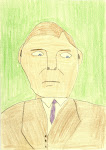Nursing my cold, I've been ruminating about the following:
The public school in that village is at the center of why both of my siblings and their mates live there. My brother and brother-in-law have had lucrative job offers in other cities, other countries, the US. Nothing thus far has tempted them to leave.
With this in mind, I found myself reading to my six-year-old nephew. He's an imaginative builder of Legos and Brio trains who is about to enter first grade in August. The book he had brought home from the school library seemed to me at at a fifth-grade reading level--eons above The Cat in the Hat. The story was simple enough, how a friendship began between a lonely old farmer and Findus, a cat, but the sentences were long, full of $10.00 words. I stumbled reading--my German is a bit rusty. I thought to myself, these Swiss throw a lot of complexity at a Kindergarten kid.
Remembering what I used to do with Simon when he was little, I tried to get my nephew involved in the reading.
Pointing at the F in Findus I said: "What sound does this letter make?"
"I don't know," he said. "Lese weiter bitte, Tante Claudia." Continue reading please, aunt Claudia.
I was struck by his politeness--at that age, Simon was mostly given to one word commands. But I was also worried. If a kid in the States does not know that F makes the sound "ffff" by the end of Kindergarten, he will be held back.
I said to my sister, ever so gently: "You know, I had a feeling he doesn't know his ABCs."
She laughed: "I don't think he does. They don't teach them any reading or writing in Kindergarten here. Can you believe it? We attended a meeting at the school last year where we were told not to teach them at home, not to force it in any way. If, and only if, our child was craving learning to read, only then could we work with him a little bit. The truth is that at this age the school discourages reading or writing."
"So, what do they learn in Kindergarten?"
"They play and learn to get long with others. They're big into social skills; they learn to shake hands like diplomats." She chuckled, imitating a handshake, palm outstretched, firm grip, vigorous shake, bowing her head slightly. "I'm not kidding. I know--the kids are so little. And they do it with each other, before and after play-dates--looks really funny. Besides that, they draw; they get stories read out loud; they make stuff; they go for walks in the hills," she pointed to the Alps rising up steeply behind her house, "in any frigging weather. Snow, steady rain. Every week they march up, up, up into the hills for half a day. Crazy Swiss." She laughed. "But the kids love it. Sometimes they come back soaked."
I looked into those hills. I've been on that trail. I'm always grateful that I stopped smoking decades ago.
From my many visits to Switzerland I know that elementary school kids, at least in this village, must walk to school every day and back. Through Kindergarten, they can be accompanied; after Kindergarten, they must walk on their own. From my brother's, it's a 20 minute hike. The children have to huff it on a sidewalk that boarders a road that has a stunning view of the Alps and Lake Lucerne; however, cars steadily whiz by at 50 miles per hour. By second grade, kids are encouraged to peddle their bike on that same road, carrying on their backs their heavy school-packs. The parking lot in front of the school fits four cars. There is no pick-up lane. If you drop off your kid by car, you get called in for a conference.
And here are some other interesting details: They barely get homework. 10 minutes in first grade. 20 in second. And yet, whatever they do in the classroom works. By the end of first grade, they all know how to read and write. By third grade they introduce English as a foreign language; in fourth grade they add French. High-school students are encouraged to pick up yet another language, if they are planning to go to university.
Back home, I'm finding myself demanding more independence from Simon. I say to him: Do it yourself. Cut your own nails. Fold your own laundry. Make your own breakfast. Stack the dishwasher. Cut the cucumbers. Vacuum your room. Toss the salad. And remember, shake hands. Sometimes I make my requests in German: Setz den Tisch, bitte. Set the table, please. Gotta push the languages.
There're no steep mountains in Miami, but I'll come up with a suitable challenge. And then maybe we'll do it in the rain.










































No comments:
Post a Comment